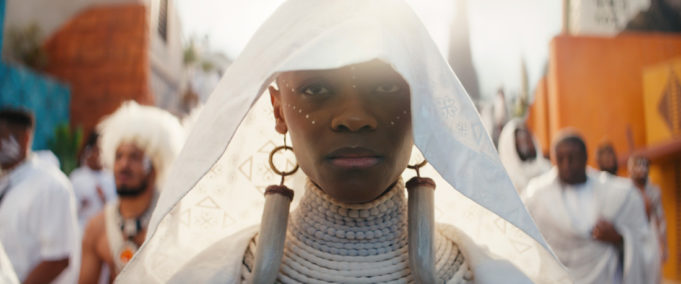When I reviewed Black Panther, I said that we hadn’t seen the limits of what Ryan Coogler could do. Surely Black Panther: Wakanda Forever represents the sternest challenges to his considerable powers. Lead actor Chadwick Boseman died in the summer of 2020 still believing that he was going to survive to film the sequel, and so he never informed Coogler about his cancer. After considering and thankfully rejecting the idea of early retirement, Coogler had some rewrites to do. The resulting movie seeks to pay tribute to the late actor’s memory while also delivering the thrills we expect from a Marvel superhero movie, and the two objectives do not sit easily alongside each other.
Will anyone care, though? The audience needs both things, and the film’s execution of both things is reasonably good. It’ll be up to wearisome nerds like me to point out the sequel’s shortcomings, but I’ll also say the movie helps us grieve the actor and the character both taken from us too soon. Don’t underestimate what that means.
After a striking montage depicting King T’Challa’s funeral rites, the story begins in earnest a year afterward, when Ramonda (Angela Bassett) has assumed the throne and Nakia (Lupita Nyong’o) has absconded to Haiti to run a school. There is no Black Panther protecting Wakanda now, and vultures are circling the country’s resources. A French raid on vibranium supplies is swiftly repelled, but the Americans manage something worse when they search for the metal on the ocean floor. They instead awaken Talokan, a civilization of water-breathing merfolk led by the flying Mayan serpent god K’uk’ulkan, a.k.a. Namor (Tenoch Huerta), who holds vast undersea storages of vibranium and is willing to destroy Wakanda and other land-based countries to protect those. Namor spirits Shuri (Letitia Wright) to his ocean kingdom, and she’s angry enough at the world over her brother’s death that she just might join him.
The women take center stage after the king’s death, especially when Shuri and Okoye (Danai Gurira) recruit MIT student Riri Williams (Dominique Thorne), who’s targeted by Namor because she invented a vibranium detector as part of a class project and inadvertently started all this. The highly amusing scene where they meet provides some comic counterweight to the remembrances of T’Challa. Wright has the heaviest emotional scenes, and she’s up to the challenge of portraying someone who has thrown herself into her work to avoid dealing with her grief. Meanwhile, Winston Duke’s M’Baku continues to show uncommon political finesse for a large guy who swings a club on the battlefield, and Bassett receives perhaps her best showcase since What’s Love Got to Do With It? almost 30 years ago. Ramonda roars like a lioness as she comes down on her general for losing her one surviving child.
Still, the film lags a bit when Shuri has her first look at Talokan — the original film’s Afrofuturist aesthetic made it feel spine-tinglingly new, and this movie’s pre-Columbian city with advanced technology doesn’t make the same impact. The same goes when Namor floods Wakanda’s capital city, though the climactic battle at sea gives us an intriguing look at Wakandan shipbuilding techniques. It’s worth making the point that Black Africans aren’t the only people dealing with the legacy of European colonization, but the metaphor here isn’t as resonant as it was in Black Panther, and Namor isn’t as memorable a villain as Michael B. Jordan’s Killmonger.
Even so, Coogler and co-writer Joe Robert Cole give us some solid nuggets of entertainment, such as Okoye’s car chase with Boston police followed by a spear fight with Talokan soldiers. Shuri journeys to the ancestral plane and finds someone completely unexpected waiting for her there, and the justice she dispenses when she defeats Namor strikes me as a wise compromise. The post-credit sequence provides one last bit of closure about T’Challa, and it should send fans of the Black Panther out of the theater satisfied. Maybe that was the hardest task facing this imperfect sequel. It gets that part right.
Black Panther: Wakanda Forever
Starring Letitia Wright and Lupita Nyong’o. Directed by Ryan Coogler. Written by Ryan Coogler and Joe Robert Cole. Rated PG-13.












